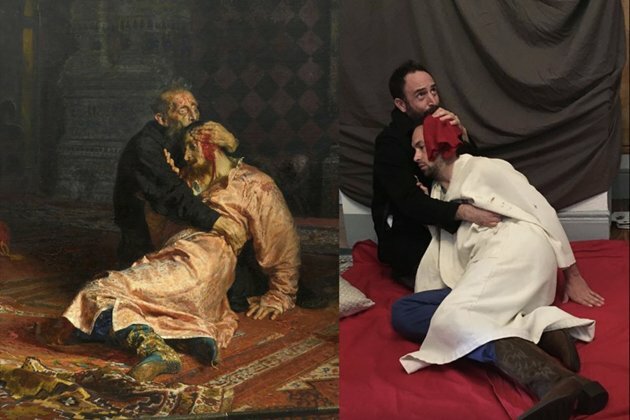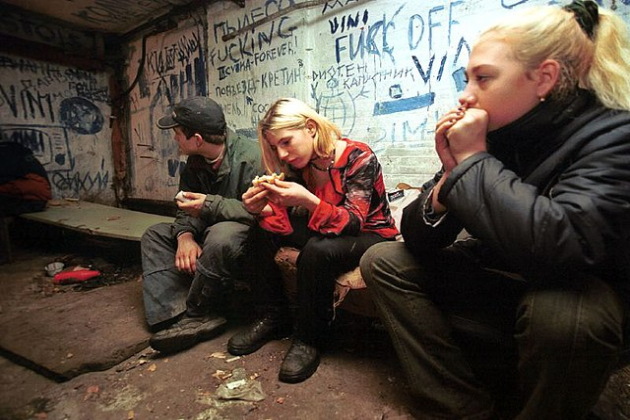Notes from the dormitory: Covid-19 and the Russian soul
Eurasianet
09 Apr 2020, 03:19 GMT+10

Editor's note: John Fraser is the pseudonym for Western student who wishes to remain anonymous, and who has decided to remain in Russia during the Covid-19 pandemic.
For any guest from the West caught in Russia during the Covid-19 pandemic, the experience feels like being a character in a serialized, satirical novel that explores the Russian soul v.3.0. There's a palpable sense that the ending of this life-as-fiction experience is a foregone conclusion. The only suspense is in guessing what twisted path the plot will take to reach its pre-destined denouement.
It's disorienting that the backdrop for the pandemic in Russia is definitely modern, but the mindset with which most people here are facing the crisis is a throwback to an earlier time. Deep down, there's still a prevailing belief that individual actions won't make much difference when confronted with larger than life, mystical forces.
You encounter such fatalism all around on the streets of St. Petersburg, the same streets once roamed by the immortal personalities created by Gogol and Dostoyevsky.
I talked to one woman not far from Nevsky Prospekt who stated casually, and without any anger or resentment, that citizens shouldn't expect the government to protect them. The government's job was to ensure the health of the state, not its people.
"No one can rely on this government, or the health system," she said. "Why worry about things you cannot change?"
Many are showing mind-numbing ambivalence to evident danger. A video making the rounds on social media shows fans of the Zenit club of St. Petersburg at a mid-March football match displaying a massive banner that read, "We're all infected with football and will die for Zenit," while engaging in a defiant chant, "we're all gonna die."
During the last weeks of March, as the pandemic was sweeping Europe and the United States but had yet to make its effects felt in Russia, many in St. Petersburg, regardless of age or education level, seemed in a state of denial, or perhaps detached resignation.
Encountering three babushki in an underpass shop, one noticed my accent and enquired suspiciously whether I was Italian, the implication being that, as a foreigner, I was probably an importer of alien thoughts and diseases. "There are many cases in Italy, but we will all be fine here. We don't have any coronavirus here," the cashier at the store interjected.
More educated office workers also weren't feeling a need to take precautions or learn lessons. For some, the official warnings to stay at home and tele-commute seemed like a hyperbolic response to news from abroad. "This is Russia, we have had worse," one young exec said. "Sure, it will be awful for a time, but then it will be over. [...] It will sort itself out."
I asked another Petersburg resident in late March why people in the city appeared so reluctant to wear masks, and he replied with a laugh, joking it was a very Russian quality to wait until the last minute to do something, and then panic intensely.
A fair share of Petersburgers are leaving their futures to fate: When the going gets tough, enlightened thinking tends to take a backseat to reflexive mysticism.
So it was for one Petersburg taxi driver, a guest worker from Tajikistan. He was well aware of the pandemic but seemed totally unconcerned. At the time of our encounter, Moscow had already mandated that cab drivers wear masks and switch them every three hours, as well as disinfect their vehicles twice a day.
"I do not fear the virus, or what might happen. I won't get sick. It's not a big deal," he said at one point.
"Why?" I asked.
"I don't really know."
The taxi driver's outlook on life was that of a modern muzhik.
Throughout Russian history, traumatic events have been given eponymous names with the appendage "-shchina" attached. Thus, the peasant uprising against Catherine the Great in the 1770s led by Yemelyan Pugachev is known as the "Pugachevshschina," and the Great Terror launched by Stalin's NKVD henchman, Nikolai Yezhov, is called the "Yezhovshchina."
It may be that when the history of the pandemic in Russia is written, the chapter will be titled the Muzhikshchina - a scourge that was much worse than it had to be because of traditional suspicions and disregard for outside influences.
 Share
Share
 Tweet
Tweet
 Share
Share
 Flip
Flip
 Email
Email
Watch latest videos
Subscribe and Follow
Get a daily dose of Irish Sun news through our daily email, its complimentary and keeps you fully up to date with world and business news as well.
News RELEASES
Publish news of your business, community or sports group, personnel appointments, major event and more by submitting a news release to Irish Sun.
More InformationInternational
SectionSan Francisco moves toward “recovery first” drug policy
SAN FRANCISCO, California: San Francisco is taking steps to change how it handles drug use. After Some people say focusing on quitting...
Trump signs order to boost skilled trades, shift from college degrees
WASHINGTON, D.C.: President Donald Trump signed an executive order to expand job training for skilled trades this week, shifting focus...
US SC judges question California’s power to set rigid emission rules
WASHINGTON, D.C.: This week, U.S. Supreme Court justices seemed open to letting fuel companies challenge California's strict vehicle...
US government fast-tracks energy, mining permits on federal lands
WASHINGTON, D.C.: The Trump administration announced this week that it will create a fast-track approval process for energy and mining...
Israeli prime minister hosts 80 international diplomats
JERUSALEM - More than 80 ambassadors and heads of mission from across the world were addressed by Israeli Prime Minister Benjamin Netanyahu...
US lawmakers subpoena Chinese telecom giants over security fears
WASHINGTON, D.C.: U.S. lawmakers are turning up the heat on China's biggest telecom firms, issuing subpoenas to compel their cooperation...
Europe
SectionRWE halts US offshore wind plans amid regulatory uncertainty
FRANKFURT, Germany: German energy giant RWE has paused its offshore wind operations in the United States, citing ongoing regulatory...
Ireland’s homelessness crisis hits record high
DUBLIN, Ireland: Ireland's homelessness crisis has hit a devastating new record, with 15,418 people living in emergency accommodation...
EU drugmakers demand higher prices to boost innovation
BRUSSELS, Belgium: European pharmaceutical companies are pushing for higher drug prices across the EU, warning that current pricing...
Toyota’s Hino and Mitsubishi Fuso near merger deal
TOKYO, Japan: Toyota's Hino Motors and Daimler Truck's Mitsubishi Fuso are edging closer to a long-awaited merger of their truck operations,...
Ireland ranks high in EU for violent assaults, EU report says
DUBLIN, Ireland: Ireland has one of the EU's highest rates of violent assault, according to new figures published by the European Commission,...
Ireland backs ban on algorithmic feeds targeting children
DUBLIN, Ireland: Social media companies could soon be required to disable addictive algorithm-driven feeds for children, under a new...













